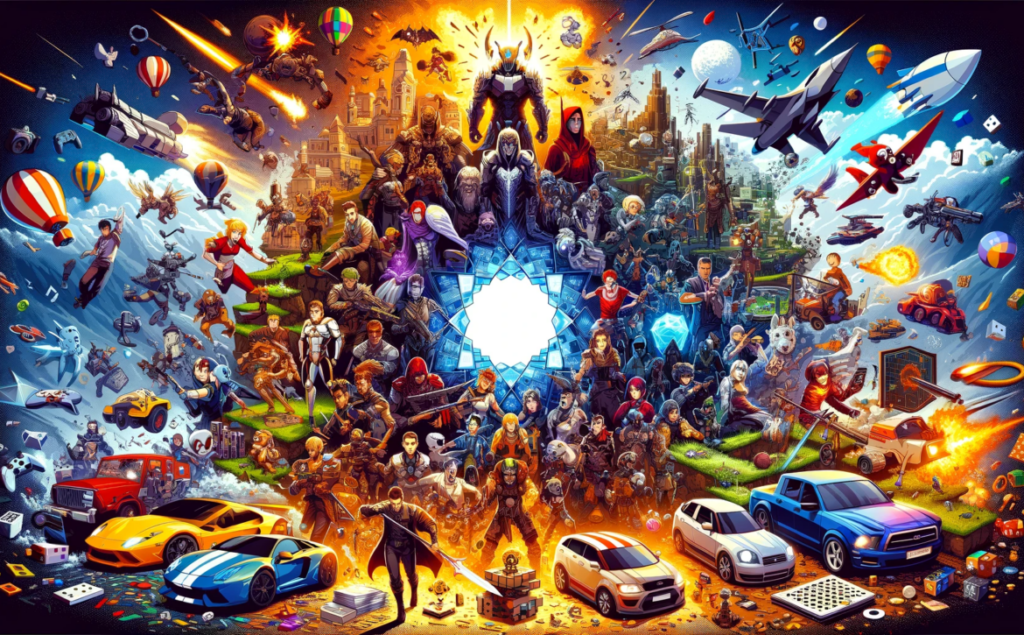The world of video games has evolved significantly over the past few decades, from simple arcade games to highly immersive, graphically advanced experiences. Gaming has become a global phenomenon, with millions of players across various platforms such as consoles, PCs, and mobile devices. In this article, we’ll dive into the different video game genres, explore current gaming trends, and discuss the future of gaming.
The Evolution of Video Games
Since the first video game was created in the 1950s, video games have come a long way. The gaming industry is now a multi-billion-dollar industry, with advancements in graphics, gameplay mechanics, and online capabilities transforming the gaming experience. Today, players can enjoy games with stunning visuals, complex narratives, and a wide variety of interactive features.
Popular Video Game Genres
- Action Games
Action games are fast-paced and emphasize physical challenges, including hand-eye coordination and reaction-time. Popular sub-genres include platformers, beat ’em ups, and hack and slash games. - Adventure Games
Adventure games typically focus on story-driven experiences, puzzles, and exploration. These games often feature a narrative-driven approach, requiring players to solve puzzles and complete quests. - Role-Playing Games (RPGs)
RPGs allow players to take on the roles of characters in a fictional world. Players usually interact with other characters, complete quests, and level up their characters. Popular RPGs include franchises like Final Fantasy and The Witcher. - Simulation Games
Simulation games aim to mimic real-world activities and environments. These can range from life simulation games like The Sims to vehicle simulators like Euro Truck Simulator. - Sports Games
Sports games are based on real-world sports such as soccer, basketball, and football. They offer competitive multiplayer experiences and often feature licensed teams, players, and tournaments. Examples include FIFA and Madden NFL. - Strategy Games
Strategy games require players to plan, think critically, and make tactical decisions. They can be either turn-based or real-time and include Starcraft, Civilization, and Age of Empires. - Multiplayer Online Battle Arenas (MOBAs)
These games focus on team-based combat where players control individual heroes, each with unique abilities, and work together to defeat the opposing team. Popular examples include League of Legends and Dota 2. - First-Person Shooters (FPS)
FPS games are based on gun-based combat from the player’s perspective. The most iconic examples include Call of Duty, Counter-Strike, and Overwatch. - Indie Games
Indie games are developed by small teams or independent developers and often offer unique gameplay experiences or artistic styles. Many indie games have gained popularity in recent years, such as Hollow Knight and Celeste.
Gaming Trends
- Esports and Competitive Gaming
Esports has become a global phenomenon, with professional gaming tournaments, sponsorships, and streaming platforms like Twitch and YouTube Gaming. Esports competitions now attract millions of viewers and offer significant prize money. - Game Streaming and Cloud Gaming
Game streaming services like Google Stadia, Nvidia GeForce Now, and Xbox Cloud Gaming allow players to stream games directly to their devices without needing expensive hardware. Cloud gaming has the potential to change how players access and play games, making gaming more accessible. - Virtual and Augmented Reality
Virtual Reality (VR) and Augmented Reality (AR) are shaping the future of gaming. VR provides an immersive experience, and games like Beat Saber and Half-Life: Alyx have revolutionized the way players interact with games. AR, with games like Pokémon GO, overlays digital elements onto the real world. - Cross-Platform Play
Cross-platform gaming has become a major trend, allowing players on different consoles or devices to play together. This has increased the sense of community and collaboration within games. - Mobile Gaming
Mobile gaming is booming, with millions of people playing games on their smartphones. Popular mobile games like Clash of Clans, PUBG Mobile, and Candy Crush have made gaming accessible to a wider audience. - Games as a Service (GaaS)
The concept of Games as a Service is growing, where games continuously receive updates, new content, and in-game purchases. This model has been embraced by titles like Fortnite, Apex Legends, and Destiny 2.
The Future of Gaming
The future of gaming looks incredibly exciting, with innovations and new technologies shaping the way games are developed and played. The following are some emerging trends that may define the future of the gaming industry:
- AI and Machine Learning
AI-powered NPCs and procedural content generation will enhance game worlds, making them more dynamic and responsive to player actions. Machine learning will also be used to improve game testing, ensuring better player experiences. - Next-Gen Consoles and Graphics
With the release of consoles like the PlayStation 5 and Xbox Series X, we’re seeing significant improvements in graphics, processing power, and overall gaming experiences. These consoles support ray tracing and 4K gaming, making visual fidelity more realistic than ever before. - Blockchain and NFTs in Gaming
Blockchain technology and NFTs (Non-Fungible Tokens) may revolutionize in-game economies and virtual ownership. Players could own, sell, and trade unique in-game items using blockchain technology, opening up new possibilities for game developers and players alike. - Increased Immersion with VR and AR
As VR and AR technologies continue to improve, gaming will become even more immersive. With advances in hardware and software, we may soon see completely realistic virtual environments where players feel as if they’ve truly entered the game world.
Conclusion
The world of video games is constantly evolving, driven by technological innovations and player demand for new and exciting experiences. Whether you’re a casual gamer or a hardcore enthusiast, there’s no shortage of games to explore. As technology continues to advance, the future of gaming looks bright with endless possibilities. Stay tuned for the next wave of gaming trends, and get ready to dive deeper into the immersive worlds that await.



